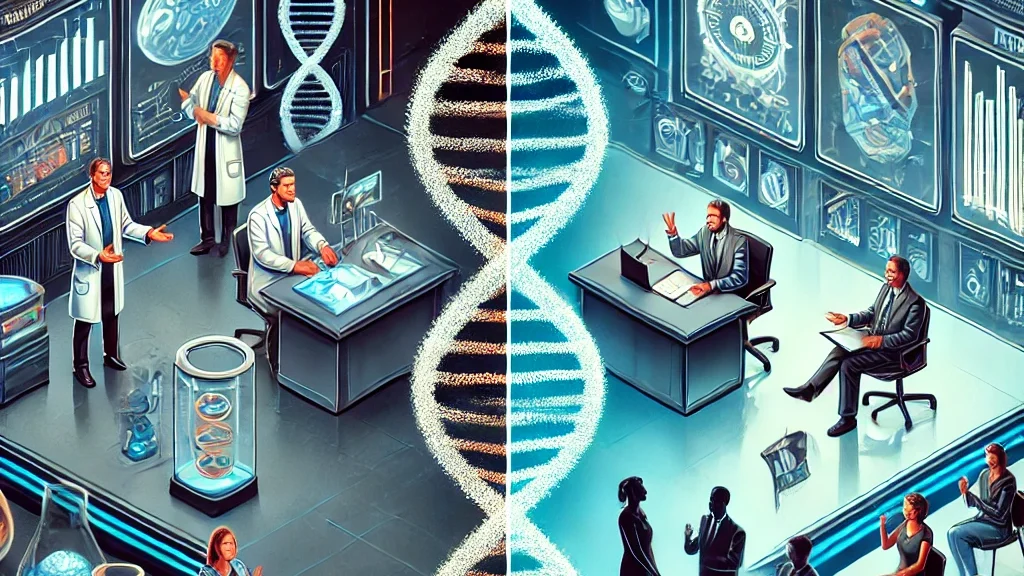
Finding Balance in Medical Ethics
Introduction
Biotechnology is revolutionizing industries from healthcare to agriculture, offering unprecedented opportunities for advancement. Yet, with great power comes great responsibility. As we harness the potential of technologies like CRISPR, stem cell research, and AI-driven innovations, ethical dilemmas emerge that challenge societal norms and values. In this blog, we explore the ethical landscape of biotechnology, balancing progress with moral considerations.
The Promises of Biotechnology
Biotechnology offers remarkable benefits, including:
- Curing Genetic Disorders: CRISPR and other gene-editing tools have the potential to eliminate hereditary diseases such as cystic fibrosis and Huntington’s disease.
- Advancing Personalized Medicine: Tailoring treatments to individual genetic profiles ensures better patient outcomes and reduced side effects.
- Enhancing Food Security: Genetically modified crops can withstand pests and climate change, addressing global hunger challenges.
These innovations underscore the transformative power of biotechnology, but they also highlight the ethical questions we must address.
Key Ethical Challenges in Biotechnology
1. **Gene Editing and “Designer Babies”
Gene-editing technologies like CRISPR enable precise alterations to DNA. While this holds promise for curing genetic disorders, it also raises concerns about creating “designer babies” with preferred physical or intellectual traits.
- Ethical Dilemma: Should society permit genetic enhancements for non-medical reasons?
- Considerations: Balancing the prevention of disease with the risk of exacerbating social inequalities.
2. Cloning and Stem Cell Research
Therapeutic cloning and stem cell research pave the way for regenerative medicine, offering treatments for conditions like Parkinson’s disease and spinal cord injuries. However, the use of embryonic stem cells sparks debates over the moral status of embryos.
- Ethical Dilemma: How do we weigh the potential to save lives against the moral implications of destroying embryos?
- Considerations: Promoting alternatives like induced pluripotent stem cells (iPSCs).
3. Bioprivacy and Data Security
Advancements in genomics and personalized medicine require the collection of vast amounts of genetic data. This raises concerns about privacy and the potential misuse of sensitive information.
- Ethical Dilemma: Who owns genetic data, and how can it be safeguarded?
- Considerations: Establishing stringent regulations to protect individuals from genetic discrimination.
4. Environmental Impacts of GMOs
Genetically modified organisms (GMOs) are hailed for their potential to improve agricultural productivity. However, concerns about their long-term environmental effects persist.
- Ethical Dilemma: Can we ensure GMOs benefit humanity without harming ecosystems?
- Considerations: Encouraging transparent research and rigorous environmental assessments.
Balancing Progress with Morality
Addressing these ethical challenges requires collaboration among scientists, policymakers, and the public. Here are key steps:
- Inclusive Dialogue: Engaging diverse stakeholders to ensure ethical frameworks reflect societal values.
- Robust Regulations: Developing policies that balance innovation with safety and equity.
- Education and Awareness: Empowering individuals to make informed decisions about biotechnological advancements.
The Role of Businesses and Individuals
Biotechnology’s future depends on responsible innovation. Businesses can:
- Prioritize ethical research practices.
- Promote transparency in product development.
- Invest in technologies that address global challenges, such as climate change and healthcare disparities.
Individuals can contribute by:
- Staying informed about biotechnological advancements.
- Advocating for equitable access to innovations.
- Supporting ethical biotech initiatives through conscious consumer choices.
Explore ethical biotech products on our Diggabyte Market.
Conclusion
The ethical considerations of biotechnology are as complex as the technologies themselves. By addressing these challenges thoughtfully, we can unlock the immense potential of biotechnology while upholding moral and societal values. Together, we can navigate this brave new world, ensuring that progress benefits all without compromising our shared humanity.
Sources:
